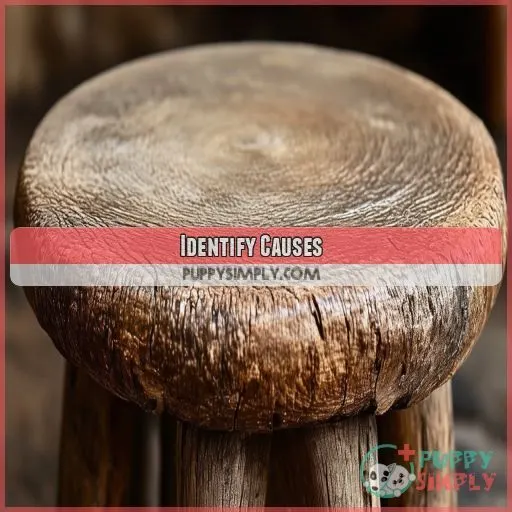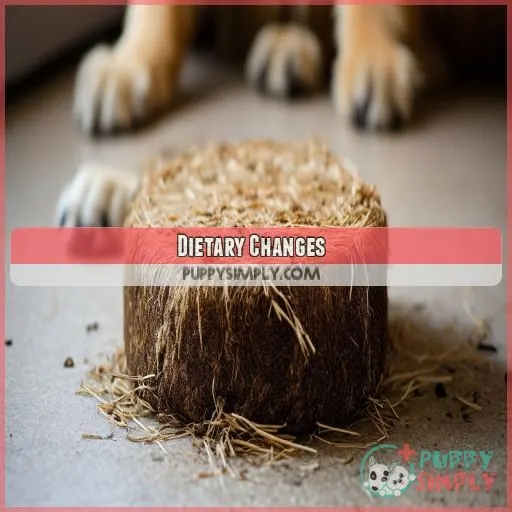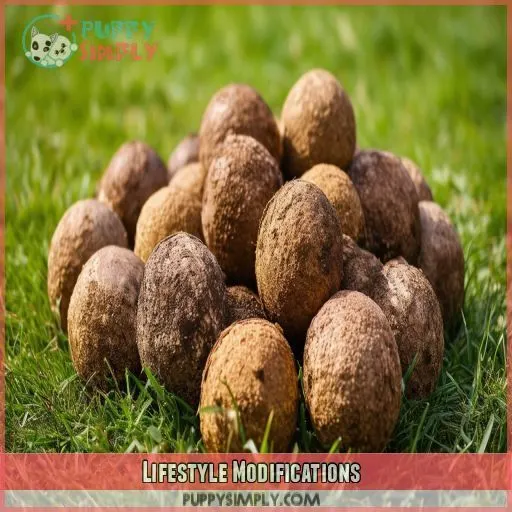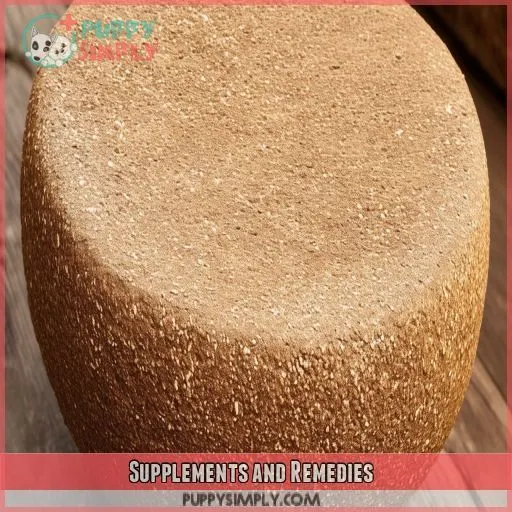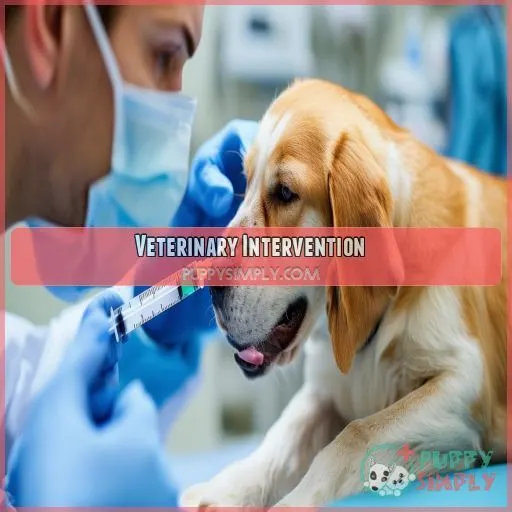This site is supported by our readers. We may earn a commission, at no cost to you, if you purchase through links.
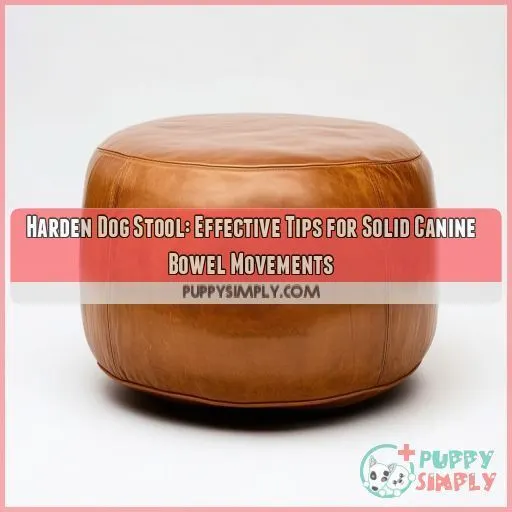 You can harden your dog’s stool by adjusting their diet and managing stress factors.
You can harden your dog’s stool by adjusting their diet and managing stress factors.
Increase fiber intake with high-quality dog food or psyllium husk powder.
Avoid bland diets and feed a balanced meal.
Reduce stress by providing a consistent routine, ample exercise, and a calm environment.
Guarantee access to fresh, clean water and wash bowls regularly.
If issues persist despite these lifestyle changes, consult your veterinarian.
Frequent diarrhea, blood or mucus in stool, lethargy, or vomiting may indicate an underlying medical condition requiring professional intervention.
For more effective tips to restore solid canine bowel movements, let’s explore further solutions.
Table Of Contents
- Key Takeaways
- How to Harden Dog Stool?
- Identify Causes
- Dietary Changes
- Lifestyle Modifications
- Supplements and Remedies
- Veterinary Intervention
- Frequently Asked Questions (FAQs)
- How do I Harden my Dog’s stools?
- How can I harden my stool?
- How do you harden dog poop After going to the bathroom?
- How do I Make my Dog’s stools drier?
- How do I transition my dog to a new diet?
- Are there specific products that can help firm stools?
- Can excessive treats or table scraps cause loose stools?
- Are there home remedies for soothing an upset stomach?
- When should I take my dog to the vet?
- Conclusion
Key Takeaways
- Letting loose? Don’t fret, furry friend! A fiber-rich diet, complete with psyllium husk powder or pumpkin puree, can whip those stools into shape faster than a doggy doing zoomies.
- Stress is a silent stool-softener, so keep your pup’s routine calm and consistent. A well-exercised, content canine is a solid-stool canine.
- If the porcelain puppy potty persists, don’t be a hero – call in the vet! Bloody stools or vomiting are red flags that require professional pampering.
- Patience is a virtue, especially when transitioning to a new diet. Gradually introduce those fiber-filled foods, and your pup’s potty predicament will be but a faint, foul memory.
How to Harden Dog Stool?
To harden dog stool, consider adding high-fiber foods like pumpkin and Probiotics to their diet, and make sure they can access clean water. Reducing stress through exercise and avoiding sudden dietary changes can also help firm up loose stools in dogs.
Identify Causes
Identifying the underlying causes of loose stools in your dog is essential for effective treatment. Dietary changes, stress factors, and medical issues can contribute to the problem, so it’s important to closely monitor your pet’s habits and seek veterinary guidance if the condition persists.
Diet Changes
One of the main culprits behind loose stools is a sudden change in your pup’s diet. To combat this:
- Switch to a high-fiber dog food
- Add psyllium husk fiber powder to meals
- Feed a high-quality, balanced diet
Avoiding bland diets and consulting your vet if issues persist can also help restore firmer bowel movements.
Stress Factors
You’re right to be concerned about stress as a contributor to your pup’s loose stools. Many factors like separation anxiety, fear of loud noises, environmental changes, lack of exercise, and inadequate sleep can trigger stress and diarrhea in dogs.
| Stressor | Impact |
|---|---|
| Separation Anxiety | Loose stools, digestive upset |
| Loud Noises | Fear response, diarrhea |
| Environmental Changes | Anxiety, stress-induced bowel issues |
| Lack of Exercise | Pent-up energy, digestive distress |
| Inadequate Sleep | Weakened immune system, loose stools |
Identifying and managing these stressors is key to hardening your dog’s stool.
Medical Issues
Not to mention, you’ll want to keep an eye out for underlying health problems that could be causing your pup’s loose stools. Bacterial overgrowth, eating foreign objects, and other medical issues can all contribute. If your dog starts:
- Whimpering or crouching over their tummy
- Seeming lethargic or excessively panting
- Passing blood or mucus in their stool
It’s time to see the vet. Don’t ignore persistent loose stools – your dog’s health depends on getting to the root cause.
Dietary Changes
To harden your dog’s stool, gradually introduce them to a high-fiber diet by incorporating fibrous dog foods or supplementing with psyllium husk fiber powder. Probiotics can also aid in firming up loose stools by promoting healthy gut bacteria.
High-Fiber Foods
You can introduce high-fiber foods to firm up your pup’s stool. Opt for a high-fiber diet and fiber-rich treats like carrots or green beans. Fiber comes in two forms: insoluble (promotes bowel movement) and soluble (adds bulk). A simple fix is sprinkling psyllium husk, a soluble fiber, over meals.
Probiotics
In addition to fiber-rich foods, incorporating probiotics can notably improve your pup’s digestive health. Probiotics replenish beneficial gut bacteria, aiding nutrient absorption and promoting firmer stools. Consider adding plain yogurt, kefir, or a pet-specific probiotic supplement to your dog’s diet following your vet’s recommendations for ideal dosage and strain selection.
Avoid Bland Diets
You’ll want to avoid bland diets as they lack fiber and digestive enzymes essential for proper gut health and stool texture. A high-quality diet with sufficient fiber intake helps maintain firm, solid bowel movements in dogs. Consult your vet if switching to a fiber-rich food doesn’t improve stool consistency within a week or two.
Lifestyle Modifications
You can reduce stress for your dog by providing a consistent routine, ample exercise, and a calm environment. Make sure your dog has access to fresh, clean water at all times, and wash their water bowls regularly to prevent bacteria buildup.
Reduce Stress
You’ll want to keep your pup’s stress levels low. Establish regular exercise routines and playtime frequency to burn energy and reduce anxiety. Provide comfort objects like toys or bedding for security. If required, consult your vet about safe anxiety medication. Regular belly rubs promote relaxation and bonding.
Provide Clean Water
You must guarantee your pup has access to clean, fresh water at all times. This helps:
- Maintain proper hydration levels
- Prevent bacterial growth in stagnant water
- Avoid dehydration risks
- Support healthy bowel movements
Providing a continuous supply of clean drinking water is essential for your dog’s overall well-being and can contribute to firmer stools.
Wash Water Bowls
You should regularly deep clean your dog’s water bowl to prevent bacteria growth and waterborne pathogens. The bowl material matters too:
| Bowl Type | Pros | Cons |
|---|---|---|
| Stainless Steel | Durable, easy to clean | Can harbor bacteria if not cleaned properly |
| Ceramic | Dishwasher-safe, non-porous | Heavier, can chip or crack |
| Plastic | Lightweight, inexpensive | Can scratch, harbor bacteria in crevices |
Proper cleaning and fresh, quality water are essential for your pup’s health.
Supplements and Remedies
To harden your dog’s stool, you can try fiber supplements like psyllium husk powder or pumpkin, which add bulk and absorb excess moisture. Reducing your dog’s feeding frequency and avoiding stressful situations may also help firm up loose bowel movements.
Fiber Supplements
In addition to dietary changes, you can also supplement your dog’s diet with fiber products to help harden stool. These include:
- Psyllium husk powder, which swells in the gut and adds bulk
- Canned pumpkin, a natural source of soluble fiber
- Over-the-counter fiber supplements designed for dogs
Fiber helps absorb excess moisture and solidify loose stools. However, introduce new fibers slowly to avoid digestive upset. Consult your vet for dosage recommendations based on your dog’s age, size, and condition.
Reduce Feeding Frequency
You can try reducing your dog’s feeding frequency to control loose stools. Splitting their daily portion into smaller, timed meals allows better digestion. Meal scheduling and portion control help regulate bowel movements. If overfeeding is the issue, split feeding and timed meals may resolve loose stool concerns.
Avoid Stressful Situations
In addition to dietary adjustments and supplements, you’ll also want to minimize stressful situations that can exacerbate loose stools. Consider:
- Crate training to reduce anxiety during your absence
- Establishing a consistent exercise routine for mental stimulation
- Using calming aids like anxiety medication or pheromone diffusers
Reducing stress plays a pivotal role in firming up your pup’s bowel movements.
Veterinary Intervention
You should seek immediate veterinary attention if your dog experiences frequent diarrhea, has blood or mucus in their stool, or shows signs of lethargy or vomiting. These symptoms could indicate an underlying health issue that requires professional medical treatment to properly address and prevent further complications.
Frequent Diarrhea
You should seek veterinary attention if your dog experiences frequent diarrhea. This could indicate dehydration, electrolyte imbalance, intestinal parasites, allergic reactions, or liver disease. Don’t wait it out; prolonged loose stools require professional care to address the underlying cause and prevent complications.
Blood or Mucus in Stool
If you notice blood or mucus in your dog’s stool, it’s a red flag indicating an underlying disease. This could signal dehydration, parasite infection, or even a more serious condition. Act quickly to identify the cause as bloody stools often require immediate veterinary attention to prevent further complications.
Lethargy or Vomiting
If your pup is lethargic, has lost their appetite, or is straining during bowel movements, it’s essential to seek veterinary care immediately. These symptoms could indicate dehydration, weight loss, or an underlying medical issue. Don’t ignore lethargy or vomiting—they’re red flags warranting prompt attention from your vet to rule out serious concerns.
Frequently Asked Questions (FAQs)
How do I Harden my Dog’s stools?
To strengthen your pup’s stools, gradually shift to a high-fiber diet. Add psyllium husk powder or canned pumpkin for additional fiber. Guarantee adequate hydration, and consult your vet if problems persist despite these measures.
How can I harden my stool?
Like a carefully curated symphony, harden your stool by fine-tuning your diet. Increase fiber intake, stay hydrated, and regulate meal timings for a harmonious balance within.
How do you harden dog poop After going to the bathroom?
To firm up your dog’s stool, gradually switch to a high-fiber diet with psyllium husk powder and probiotics. Avoid stress, provide clean water, and consult your vet if issues persist.
How do I Make my Dog’s stools drier?
While dietary changes are often effective, adding a fiber supplement like psyllium husk can help firm up loose stools. If issues persist, consult your vet to rule out any underlying health problems.
How do I transition my dog to a new diet?
Gradually switch your dog to a new diet over 5-7 days by mixing it with their current food, increasing the ratio of new food daily. Monitor stools closely and consult your vet if issues persist.
Are there specific products that can help firm stools?
Imagine your dog’s stool as a shapeshifter – you can mold it into firm form. Products like pumpkin, psyllium husk, probiotics, and a high-fiber diet can help achieve that perfectly sculpted stool you desire.
Can excessive treats or table scraps cause loose stools?
Yes, excessive treats or table scraps can absolutely cause loose stools in dogs. The extra fats, seasonings, and ingredients can upset their delicate digestive system, leading to diarrhea or soft stool.
Are there home remedies for soothing an upset stomach?
For a soothing upset tummy, try pumpkin puree or boiled chicken and rice. Probiotics and digestive enzymes can also help soothe that furry belly.
When should I take my dog to the vet?
You should take your dog to the vet if they experience frequent diarrhea, blood or mucus in their stool, vomiting, lethargy, or no improvement after home remedies. Persistent issues require professional evaluation to address any underlying health concerns.
Conclusion
Like guiding a ship to calmer waters, solidifying your dog’s stool requires diligent efforts.
Implementing dietary changes, reducing stress, and considering supplements can aid in restoring solid bowel movements.
However, if issues persist despite these measures, consult your veterinarian to rule out underlying medical conditions requiring professional intervention.
With patience and the right approach, you can navigate your canine companion to improved digestion and overall well-being.

